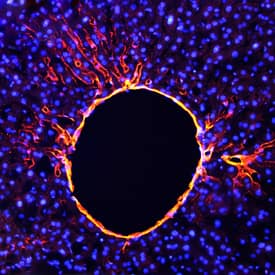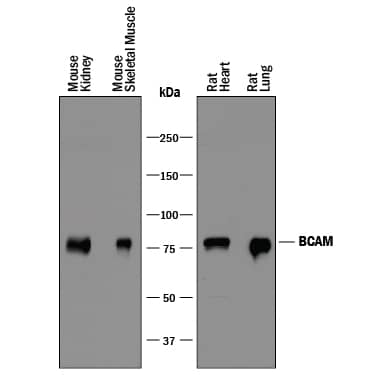Mouse/Rat BCAM Antibody
R&D Systems, part of Bio-Techne | Catalog # AF8299

Key Product Details
Species Reactivity
Validated:
Cited:
Applications
Validated:
Cited:
Label
Antibody Source
Product Specifications
Immunogen
Met1-Ala541
Accession # Q9R069
Specificity
Clonality
Host
Isotype
Scientific Data Images for Mouse/Rat BCAM Antibody
Detection of Mouse and Rat BCAM by Western Blot.
Western blot shows lysates of mouse kidney tissue, mouse skeletal muscle tissue, rat heart tissue, and rat lung tissue. PVDF membrane was probed with 0.5 µg/mL of Goat Anti-Mouse/Rat BCAM Antigen Affinity-purified Polyclonal Antibody (Catalog # AF8299) followed by HRP-conjugated Anti-Goat IgG Secondary Antibody (Catalog # HAF017). A specific band was detected for BCAM at approximately 80 kDa (as indicated). This experiment was conducted under reducing conditions and using Immunoblot Buffer Group 1.BCAM in Mouse Liver.
BCAM was detected in perfusion fixed frozen sections of mouse liver using Goat Anti-Mouse/Rat BCAM Antigen Affinity-purified Polyclonal Antibody (Catalog # AF8299) at 1.7 µg/mL overnight at 4 °C. Tissue was stained using the NorthernLights™ 557-conjugated Anti-Goat IgG Secondary Antibody (red; Catalog # NL001) and counterstained with DAPI (blue). Specific staining was localized to endothelial cells. View our protocol for Fluorescent IHC Staining of Frozen Tissue Sections.Applications for Mouse/Rat BCAM Antibody
Immunohistochemistry
Sample: Perfusion fixed frozen sections of mouse liver
Western Blot
Sample: Mouse kidney tissue, mouse skeletal muscle tissue, rat heart tissue, and rat lung tissue
Formulation, Preparation, and Storage
Purification
Reconstitution
Formulation
Shipping
Stability & Storage
- 12 months from date of receipt, -20 to -70 °C as supplied.
- 1 month, 2 to 8 °C under sterile conditions after reconstitution.
- 6 months, -20 to -70 °C under sterile conditions after reconstitution.
Background: BCAM
Mouse BCAM (Basal cell adhesion molecule, B-CAM cell surface glycoprotein,Lutheran antigen, and CD239) is a 70-90 kDa membrane glycoprotein. BCAM has wide tissue distribution and is expressed on erythrocytes, the endothelium of blood vessels and on the basal layer of cells in the epithelia. The expression of BCAM in normal tissues is higher in fetal versus adult tissues. BCAM expression is also upregulated in activated keratinocytes and following malignant transformation in some cell types in vivo and in vitro. BCAM has been shown to be an adhesion molecule that binds laminin, a basement membrane protein involved in cell differentiation, adhesion, migration and proliferation. Over aa 1-541, mouse BCAM is 91% identical to rat BCAM.
Long Name
Alternate Names
Gene Symbol
UniProt
Additional BCAM Products
Product Documents for Mouse/Rat BCAM Antibody
Product Specific Notices for Mouse/Rat BCAM Antibody
For research use only

